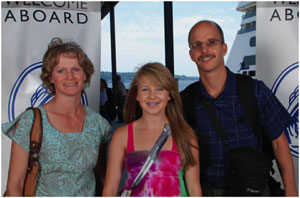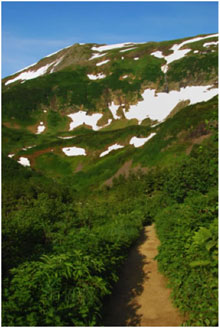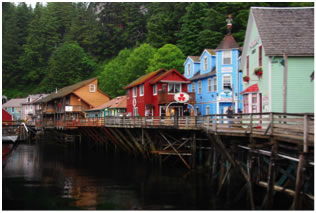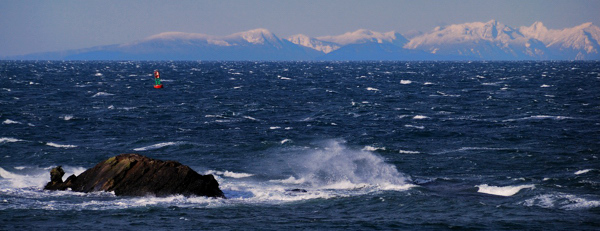Trip Report: Alaska Cruise with Hay House
by Curt and Mary Remington
Monday, August 3rd, 2009
Alaska Cruise and Port Details
We boarded the ship to Alaska with anticipation, knowing this cruise could be a key turning point in our lives. Hay House (see ad to the right), a major book publisher, reserved the entire 1,380 passenger ship, the MS Amsterdam. Part of this group, myself included, signed up for a writer’s workshop with a contest for a book deal. As you may know from my blogs, I’ve been writing a book on meditation. You may also know that my wife and I are in regular communication with the spiritual realm. The book idea, Hay House as a publisher, and signing up for this cruise were all ideas strongly encouraged by advanced spirits. They didn’t exactly promise I’d get the book deal out of this cruise, but they did strongly allude to the possibility. That’s close enough to get me excited.
Mary, my wife and a talented clairvoyant, eagerly signed up for another on-board program, featuring eight keynote speakers: Wayne Dyer, Brian Weiss, Sonia Choquette, Gregg Braden, Caroline Myss, Iyanla Vanzant, John Holland and Cheryl Richardson. Mary wrote the last section of this blog, describing her experience.
Heather, one of our teenage daughters, had some mixed feelings about the cruise. She looked forward to fun activities, great food and a chance to shop, while maybe feeling apprehensive about a cruiseship full of psychics and spiritually enlightened people. We all found the fellow passengers to be very warm, friendly, open-minded and quite normal.
 As an added bonus for all three of us, these seminars were taking place on a Holland America ship that would be cruising past the rugged islands and coasts of British Columbia and Alaska, visiting places like Juneau, Sitka, Ketchikan, Hubbard Glacier and Victoria, British Columbia. While boating in Washington’s San Juan Islands, close to home, I’ve often dreamt of continuing north to these places. In fact, I have an earlier manuscript about The Passage. That link will take you to a chapter that was published in a canoe magazine, while Goat Hunt will take you to a chapter about a man facing aging and his mortality.
As an added bonus for all three of us, these seminars were taking place on a Holland America ship that would be cruising past the rugged islands and coasts of British Columbia and Alaska, visiting places like Juneau, Sitka, Ketchikan, Hubbard Glacier and Victoria, British Columbia. While boating in Washington’s San Juan Islands, close to home, I’ve often dreamt of continuing north to these places. In fact, I have an earlier manuscript about The Passage. That link will take you to a chapter that was published in a canoe magazine, while Goat Hunt will take you to a chapter about a man facing aging and his mortality.
For the first day, the ship, Holland America’s Amsterdam, made  smooth, steady progress through the open Pacific and waves which would’ve tossed my 23′ boat around violently. Along with Hay House programs, the ship offered a whole variety of activities like working out, shopping, gambling and of course eating.
smooth, steady progress through the open Pacific and waves which would’ve tossed my 23′ boat around violently. Along with Hay House programs, the ship offered a whole variety of activities like working out, shopping, gambling and of course eating.
The second morning, the Amsterdam cruised up sunny Gastineau Channel, with views of fishing boats and snow-capped peaks, arriving in Juneau at 11 am. Although it’s the capital of Alaska, Juneau can only be reached by air or sea, unless you have a dog sled and are very adventurous. The downtown cruise dock area is lined with tourist shops and surprising bargains, like an Alaska t-shirt for $4.99 or a small bag of quartz for $2.99. For someone with more expensive tastes, there’s also perfume, watches, electronics, furs and artwork. There are even free items stores give away, just to get you in the door.
We left the shopping behind, as a jet boat brought us across to Douglas Island and a ”rain-forest canopy and zip line adventure.” The thrill comes as you launch yourself off a tree-platform, hanging from a climbing harness and pulleys, then slide “zip” on cables as much as 180 feet above the ground. Approaching the next platform at over 30 mph, you reach up and grab the cable, stopping your zip just before crashing into the tree. The course has ten cable sections, covering 6,000 feet of cable, along with treetop suspension bridges, finishing with a rappel to the ground.
 Once back in Juneau, we boarded the Mt Roberts Tramway. It departs from the dock area, carrying passengers 1800 feet above downtown, to a visitor’s center. Mt Roberts has a network of hiking trails, with spectacular views of Juneau, Gastineau Channel and the surrounding mountains.
Once back in Juneau, we boarded the Mt Roberts Tramway. It departs from the dock area, carrying passengers 1800 feet above downtown, to a visitor’s center. Mt Roberts has a network of hiking trails, with spectacular views of Juneau, Gastineau Channel and the surrounding mountains.
After a few miles of hiking, Heather returned to the ship, tired from the day’s adventures. Mary and I had just enough energy left to drink a cold Alaskan beer at Hangar on the Wharf Pub and Grill, a renovated seaplane hangar. Beyond Mary and the beer, you can see the Amsterdam towering over the red jet boat from our zipline tour. As we made our way back to the ship, three floatplanes descended to the channel and pulled up to the dock in front of the bar.
Day four, the ship made slow progress through fog and small icebergs in Yakutat Bay. Early afternoon, the fog lifted, revealing the jagged peaks of Fairweather Mountains along with Hubbard Glacier, the longest tidewater glacier in Alaska. It extends 76 miles from its source, with a ”calving face” stretching for six miles across the bay. The glacier appears very blue, since the ice absorbs other wavelengths of light. At the steepest part of the face, large chunks of ice rumbled, then cracked off, sending up immense plumes of spray.
Sitka is a beautiful town and an important part of Alaskan history. The port was originally settled by Tlingit  natives. Through negotiations and fighting, control passed between the Tlingits and Russians a few times, with Sitka becoming the Russian capital of Alaska in 1808. The US bought Alaska in 1867 and kept Sitka the capital until 1906.
natives. Through negotiations and fighting, control passed between the Tlingits and Russians a few times, with Sitka becoming the Russian capital of Alaska in 1808. The US bought Alaska in 1867 and kept Sitka the capital until 1906.
After taking a tender (lifeboat) to shore, we picked up our reserved mountain bikes. This turned out to be a great way to see a lot, with limited time. We managed a trail to an alpine lake, an eagle center, historic park, Bishop’s mansion tour, lunch and still fit in some downtown shopping. Who needs to rest while on vacation?
Ketchikan is the rainiest city in the US, with 152 inches of “liquid sunshine” a year. Sure enough, it rained. The local weather forecast joke goes, “If you can’t see Deer Mountain, it’s raining. If you can see it, it’s about to rain.” Our original plan to hike up Deer Mountain didn’t make much sense, because if you can’t see Deer Mountain, you probably can’t see much from the mountain either. We settled on a walk around town and exploring the marina. Creek St, an old red-light district, has very quaint shops with some true bargains, like fleece jackets for $20.
 Downtown Victoria, British Columbia is spectacularly scenic and has a long list of things for tourists to do. This city is close enough to home that we’ve visited regularly. The harbor has float planes, yachts and tourist tugs, along with views of the Empress Hotel, Parliament Building and the distant Olympic Mountains. Having seen most other sights, we walked the harbor and visited the Royal Canadian Wax Museum, which you can see just above the old yacht’s stern.
Downtown Victoria, British Columbia is spectacularly scenic and has a long list of things for tourists to do. This city is close enough to home that we’ve visited regularly. The harbor has float planes, yachts and tourist tugs, along with views of the Empress Hotel, Parliament Building and the distant Olympic Mountains. Having seen most other sights, we walked the harbor and visited the Royal Canadian Wax Museum, which you can see just above the old yacht’s stern.
Writer’s Workshop
Between all the adventures and sightseeing, I did manage to attend the on-board writer’s workshop, learning powerful techniques for writing and for improving and marketing my book project, Simple Meditation: Connecting With Spirit and Finding Your Life’s Purpose. As I mentioned earlier, my book proposal will be entered in a contest (winner picked in December) for a deal with Hay House, the publisher highly recommended by my spiritual contacts. Along with the quality of the book, publishers also look at the number of contacts writers have, so please sign up for my new Facebook fan page. You might help ensure the success of my book, get more people meditating, and improve the quality of life on the planet Earth. Thanks!
As you may have noticed, I was so enthused about Hay House that I signed up as an advertiser. Clicking on any of the Hay House banners will take you to the appropriate page of their website where you can find enlightening books, cd’s and cards. Buying and reading some might dramatically improve your life.
any of the Hay House banners will take you to the appropriate page of their website where you can find enlightening books, cd’s and cards. Buying and reading some might dramatically improve your life.
The night before the cruise, we went to see Wayne Dyer speak in Seattle. My daughter, Heather, was so moved by his talk that she asked if she could listen to all the speakers on the cruise. We signed her up, so she and Mary attended them together. Heather enjoyed and learned a great deal from all eight speakers. Unfortunately, I missed these, so Mary wrote the rest of this blog, describing the talks she attended.
Mary’s Write-Up of Hay House Program
 When I look back on this life changing and inspirational experience, it will be remembered with great reverence and gratitude. I am grateful to our spirit guide “Chief” who, without a doubt, was the guiding light that inspired my husband and I to go. I would also like to extend my greatest appreciation to all of the Hay House authors who have inspired me and touched my soul forever. They have devoted their lives to such worthy and healing causes, which is surely having a ripple affect throughout our planet. Although I couldn’t possibly sum up all of the invaluable information I absorbed during the seminars, I would like to share some of my thoughts and say “thank you” to each author.
When I look back on this life changing and inspirational experience, it will be remembered with great reverence and gratitude. I am grateful to our spirit guide “Chief” who, without a doubt, was the guiding light that inspired my husband and I to go. I would also like to extend my greatest appreciation to all of the Hay House authors who have inspired me and touched my soul forever. They have devoted their lives to such worthy and healing causes, which is surely having a ripple affect throughout our planet. Although I couldn’t possibly sum up all of the invaluable information I absorbed during the seminars, I would like to share some of my thoughts and say “thank you” to each author.
Wayne Dyer
How can I begin? I would consider him one of the greatest inspirational teachers of this generation. My husband, Curt, has been a big advocate of his for many years, since he read “Your Erroneous Zones.” He has promoted this book to the whole family, from time to time, for various reasons. If you had a problem, it was always “go read Your Erroneous Zones”. He read it as a teen ,at a time when he was searching for answers, and it changed his life. I have
great admiration for Wayne Dyer. From all of the turmoil in his childhood, he found a way to transform his life into something with great meaning and purpose. He had a vision and he followed it and continues to follow it. He truly motivates and inspires everyone he touches.
Caroline Myss
What a smart, tough, no excuses approach to heal your life. She tells it like it is and teaches us to take a hard look at ourselves, stop blaming others and stop trying to find a reason for what’s gone wrong in our lives. She emphasized forgiveness, gratitude and being of service. This was my first con tact with Caroline Myss and will definitely not be my last. I feel that my life’s purpose is in healing and I’m like a sponge for any information about it. Thank you Caroline for your inspiring words.
Brian Weiss
He’s definitely good at what he does. He had the entire audience in a state of hypnosis in a flash with his caaaalm, soooothing voice and description of beautiful, peaceful places. Who wouldn’t want to go there? I’m a strong believer in re-incarnation and know that healing can come from discovering events or trauma in our past lives, that keep us stuck or unhappy in our present lives. Brian Weiss is well respected, and his revolutionary techniques are revered world wide. He’s certainly an advocate of meditation, which I think is a healing and powerful practice that we should all adopt.
Sonia Choquette
Sonia is a gifted psychic with a colorful, creative and energetic personality, and she knows how to have fun! Sonia teaches us how to wake up our spirit and our sixth or psychic sense. We need to listen to our higher self, which has important information that we cannot get from our conscious mind. She also stresses the importance of connecting with the creator, our spirit guides and angels who help guide us on our path. To help us let go of our inhibitions and wake up our spirit, a little dancing didn’t hurt either. Very fun!
Gregg Braden
Gregg’s talk was a mix of science, history and spirituality that was fascinating. It was interesting to learn that we’ve had cycles throughout history and these cycles or patterns repeat themselves. Most importantly, the choices we make as a species, can have a big impact on these cycles. The Mayan predictions about the end of time in 2012 have many people questioning, is it true and, if so, what can we do to change it. Getting in touch with our inner spirit, letting go of fear, helping others and healing the planet are some of the things we can do now. Gregg’s vision of our future left me very encouraged and hopeful
Iyanla Vanzant
Iyanla is a vibrant, free spirited, crazy kind of woman and I loved her! Starting with some Hallelujah’s, some movin’ and swayin‘, connecting with ourselves as spirit and having great gratitude for life was a wonderful way to start the day. What a beautiful soul she is. She is a minister of God and seems very devoted to helping us get beyond our past and find our purpose. Again, this was my first experience with Iyanla, and I left feeling truly empowered.
John Holland
John is a gifted psychic medium who connects with the audience in a unique and compassionate way. He is very dedicated to what he does and delivers such healing messages from the spirit world to those that are grieving. It is so wonderful to see the audience reaction, knowing that their loved ones are still around and want to communicate with them. Tears of happiness pour from them and they’re surrounded with comfort and peace. It brought me to tears to watch. I’m finishing my clairvoyant training this fall, and I know how good it feels to be able to help people in this way. The healing goes both ways and it’s very rewarding.
Cheryl Richardson
 I really connected with what Cheryl Richardson had to say, because I too, am the general manager of my universe. I am constantly busying myself and doing doing doing for everyone else, leaving what I want for last. Often, this time in the day never comes. Cheryl teaches us to make our own selves a top priority, which is something I don’t often do. My own family recognizes that in me, more than I do. This was a big wake up call for me. I need to get to know me! Wow! What a concept! I’m reading Cheryl’s book “Stand Up For Your Life” and I’ve scheduled a solo vision quest for myself in early August so I can get started getting to know me and my purpose in life. Thanks Cheryl!
I really connected with what Cheryl Richardson had to say, because I too, am the general manager of my universe. I am constantly busying myself and doing doing doing for everyone else, leaving what I want for last. Often, this time in the day never comes. Cheryl teaches us to make our own selves a top priority, which is something I don’t often do. My own family recognizes that in me, more than I do. This was a big wake up call for me. I need to get to know me! Wow! What a concept! I’m reading Cheryl’s book “Stand Up For Your Life” and I’ve scheduled a solo vision quest for myself in early August so I can get started getting to know me and my purpose in life. Thanks Cheryl!
Conclusion
In conclusion, I would also like to say a great big thanks to Louise Hay and all of the staff and help that made the Alaska cruise possible. I’ve had a very tough past year with one of my daughters, and this was just what the doctor ordered to nourish my soul. I feel that I can get back on track and move forward again. Thanks to all of you! Mary Remington





